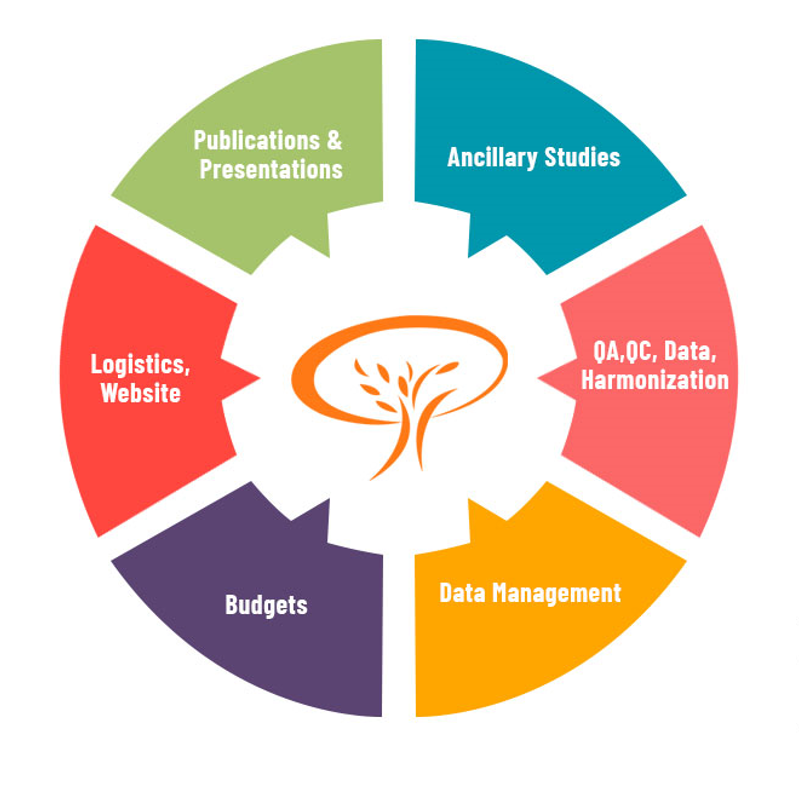Analysis Methods Core

Co-Leaders: Jeffrey O’Connell and Paola Sebastiani
The LLFS Analysis Methods Core mission is to ensure that the research conducted by LLFS investigators to accomplish the aims of the LLFS Project use best practices for robust, reproducible and interpretable analysis of LLFS phenotypic, genetic and -omics data. This will be accomplished by working closely with the Phenotyping and Biospecimen Cores to guarantee high-quality data for analysis. The Analysis Methods Core will also provide standards, recommendations, support, scripts, and training for deploying state-of-the-art analysis procedures, and to maximize engagement and opportunities for all LLFS investgators to leveage this unique resource to discover mechanisms of healthy aging. This does not mean that the Analysis Methods Core will be expected to perform all analyses for all publications of the LLFS project, rather the Analysis Methods Core will guide the LLFS investigators at all sites with their publications, and analyses for publications will take place by the LLFS investigators at their institutions.
Types of analyses and data that the Analysis Methods Core will provide guidance and support for include phenotypic, genetic, genomic, and data integrations. The Analysis Methods Core will also address and fill existing gaps in methodology such as the applicaiton of machiine learning methods and joint-modeling techniques to integrative analysis of omics data in a family-based, longitudinal study. The Analysis Methods Core will also recommend methods for standardization and harmonization of data across studies performing collaborative work with LLFS. The Analysis Methods Core Aims are as follows:
Aim 1
Recommend and support state-of-the-art methods for analyses proposed in the LLFS project and for collaborationso with other studies.
Aim 2
Support reproducible analysis of LLFS data by implementing and sharing scripts for analysis.
Aim 3
Training and distribution of analysis methods and softward among LLFS investigators.
Biodemography Group
Develop and apply biodemographic methods to better understand joint aging and survival effects incorporating newly collected multi-omics data.
Biostatistics Group
Established and experienced biostatisticians that will guide script development and suggest analytic methods for the LLFS data. Expertise in longitudinal and epidemiological modeling. Will co-lead analyses using longitudinal trajectories in the LLFS data. Additionall expertise in Bayesian network modeling, accounting for the simultaneous effects of multiple genetic and environmental factors and their interactions while also adjusting for population structure and familial relatedness. Additionally, we will address issues of informative censoring, data reduction techniques, pattern discovery, and data harmonization.
OMICS Group
Established and experienced biostatisticians with OMIC data analysis and family analysis methods expertise. Will support the pedigree/linkage/association using Whole Genome Sequence Data. Support pipelines for Quality Control and Quality Assurance and analysis of the whole-genome bisulfite sequence data that will be generated. Share statistical methods for correction of aging-related variation in blood cell counts and methods for assessment of biological age using the methylation clock. Support methylation-wide associtaion studies of healthy aging phenotypes to discover epigenetic mechanisms of biological aging.
Pedigree/Linkage Group
Established and experienced biostatisticians with extensive knowledge of pedigree data analysis. Will support the pedigree/linkage/association using Whole Genome Sequence Data. Includes best practices of cleaning the WGS data as well as new methods development for family data, as needed. Support use of MMAP which is computationally efficient and implements flexible variance component models to integrate multi-omics data and trans-omics interactions to identify mediation and co-localization pathways, importnat to understanding mechanisms. Extensive use of SOLAR and MMAP for analyses.
Systems Biology Group
Established and experienced biostatisticians with extensive knowledge of pedigree data analysis. Will support the pedigree/linkage/association using Whole Genome Sequence Data. Includes best practices of cleaning the WGS data as well as new methods development for family data, as needed. Support use of MMAP which is computationally efficient and implements flexible variance component models to integrate multi-omics data and trans-omics interactions to identify mediation and co-localization pathways, importnat to understanding mechanisms. Extensive use of SOLAR and MMAP for analyses.
